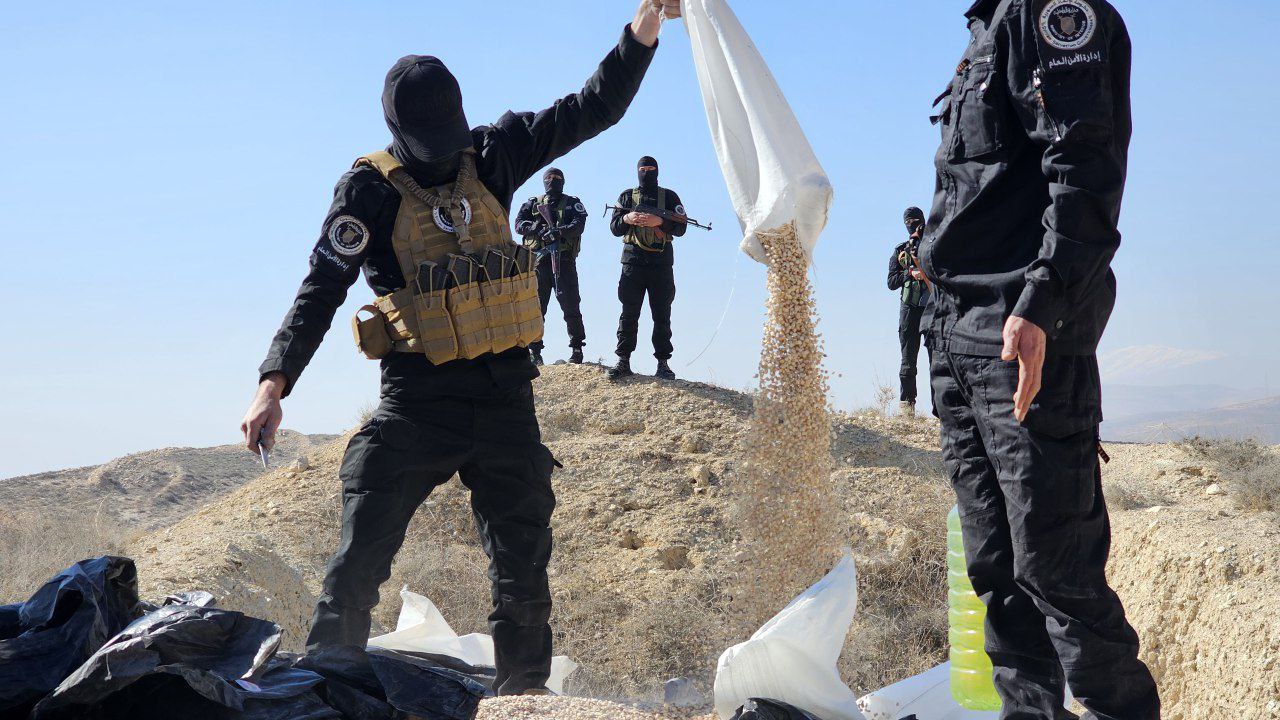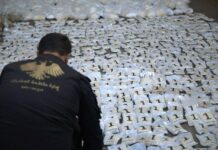
The Syrian Transitional Government (STG) has ramped up efforts to combat the illegal trade in weapons and narcotics, targeting networks deeply entrenched during the Assad regime. Recent operations by the General Security Administration (GSA) and Command of Military Operations (CMO) have uncovered extensive smuggling routes, warehouses, and factories tied to drug production, particularly the amphetamine-like stimulant Captagon.
Weapons Smuggling Foiled
On Friday, security forces in Tartous Governorate thwarted an attempt to smuggle weapons into Lebanon through illegal crossings. The GSA, in coordination with local intelligence, intercepted a shipment concealed in a truck carrying fodder. Among the confiscated items were Kalashnikov rifles, machine guns, guided missiles, and ammunition, according to the state-run Syrian News Agency (SANA).
“These efforts are part of a broader initiative to secure borders and dismantle illegal networks that threaten regional stability,” an official statement said.
Caretaker Lebanese Prime Minister Najib Mikati, during a recent meeting with STG leader Ahmad al-Sharaa in Damascus, emphasized the need for tighter border controls to combat smuggling. Al-Sharaa announced the formation of specialized committees to address border security, a critical issue given the porous and mountainous frontier between the two nations.
Crackdown on Captagon
In Latakia, security forces uncovered a warehouse used to package Captagon pills inside children’s toys and furniture. The facility, linked to remnants of the Assad regime’s Fourth Division, was reportedly preparing shipments for export to Gulf nations, including Saudi Arabia.
This follows the discovery of a major drug factory inside a villa west of Damascus belonging to Maher al-Assad, the ousted president’s brother. The factory housed raw materials and equipment used for producing Captagon, a trade Western governments estimate to be worth billions of dollars annually.
“The Fourth Division and other regime-aligned entities turned Captagon production into a central pillar of Syria’s economy during the war,” said a security official. “Now, dismantling these operations is a top priority for the (STG.)”
International Implications
The Captagon trade under Assad was not merely a criminal enterprise but a political tool used to fund the regime and exert pressure on neighboring countries. By flooding Gulf markets with the drug, the regime sought leverage in normalization talks and sanctions relief.
The United States and its allies have long accused the Assad regime of facilitating Captagon’s production and export. With the regime’s fall, STG forces have exposed the extent of these operations, discovering caches in military bases, detention centers, and luxury properties.
Rehabilitation & Reconstruction
Ahmad al-Sharaa has emphasized the need to address addiction as a public health issue. Speaking at the historic Umayyad Mosque, he outlined plans for transitional policies aimed at curbing the drug trade, rehabilitating victims, and redirecting resources toward legitimate industries, including Syria’s once-thriving pharmaceutical sector.
Reviving the pharmaceutical industry could provide a sustainable alternative to illicit drug production. However, experts argue that easing sanctions on Syria’s pharmaceutical sector will be critical to securing raw materials and attracting international investment.
Challenges Ahead
Despite significant progress, dismantling Syria’s drug trade remains a complex task. Smaller Captagon labs continue to operate, and criminal networks are adapting by shifting production to neighboring countries such as Lebanon, Iraq, and Turkey.
“The fall of Assad’s regime was a turning point, but the Captagon trade is far from over,” said a counter-narcotics expert. “These networks are resilient and have already begun relocating operations.”
The STG faces the dual challenge of addressing Syria’s drug legacy while securing international support for reconstruction. As it works to rebuild institutions and secure borders, continued vigilance and international cooperation will be essential to ensuring long-term stability and curbing the regional impact of Syria’s illicit trade.








